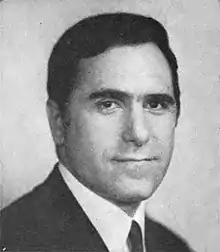1972 United States Senate election in North Carolina
The North Carolina United States Senate election of 1972 was held on 7 November 1972 as part of the nationwide elections to the Senate, and coinciding with the 1972 presidential election. The general election was fought between the Republican nominee Jesse Helms and the Democratic nominee Rep. Nick Galifianakis. Helms won the election, becoming the first Republican to win a Senate seat in North Carolina in the twentieth century.
| |||||||||||||||||
| |||||||||||||||||
 County results Helms: 50–60% 60–70% 70–80% Galifianakis: 50–60% 60–70% 70–80% | |||||||||||||||||
| |||||||||||||||||
| Elections in North Carolina |
|---|
 |
Three-term Representative Nick Galifianakis defeated two-term incumbent Senator B. Everett Jordan in the second ballot in the Democratic primary. Galifianakis was seen as an anti-establishment liberal in North Carolina,[1][2] although an opponent of busing.
Primaries
Democratic primary
| Party | Candidate | Votes | % | ±% | |
|---|---|---|---|---|---|
| Democratic | Nick Galifianakis | 377,993 | 49.25% | N/A | |
| Democratic | B. Everett Jordan (incumbent) | 340,391 | 44.35% | -34.91% | |
| Democratic | J. R. Brown | 27,009 | 3.52% | N/A | |
| Democratic | Eugene Grace | 22,156 | 2.89% | N/A | |
| Turnout | 767,549 | ||||
| Party | Candidate | Votes | % | ±% | |
|---|---|---|---|---|---|
| Democratic | Nick Galifianakis | 338,558 | 55.82% | +6.57% | |
| Democratic | B. Everett Jordan (incumbent) | 267,997 | 44.18% | -0.17% | |
| Turnout | 606,555 | ||||
Republican primary
| Party | Candidate | Votes | % | ±% | |
|---|---|---|---|---|---|
| Republican | Jesse Helms | 92,496 | 60.13% | N/A | |
| Republican | James Johnson | 45,303 | 29.45% | N/A | |
| Republican | William Booe | 16,032 | 10.42% | N/A | |
| Turnout | 153,831 | ||||
Result
| Party | Candidate | Votes | % | ±% | |
|---|---|---|---|---|---|
| Republican | Jesse Helms | 795,247 | 54.01% | +9.61% | |
| Democratic | Nick Galifianakis | 677,293 | 45.99% | -9.60% | |
| Turnout | 1,472,540 | ||||
Footnotes
- Hunter, Marjorie (5 June 1972). "Defeat of Jordan by Rep. Galifianakis In Carolina is Linked to 'New Politics'". The New York Times. p. 26.
- Hunter, Marjorie (28 October 1972). "Major Races in North Carolina Seem Close". The New York Times. p. 14.
- "North Carolina DataNet #46" (PDF). University of North Carolina. April 2008. Archived from the original (PDF) on 2008-07-25. Retrieved 2009-06-12.
This article is issued from Wikipedia. The text is licensed under Creative Commons - Attribution - Sharealike. Additional terms may apply for the media files.

